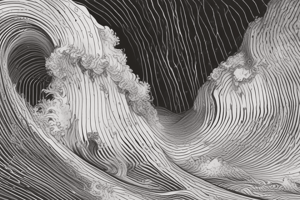Podcast
Questions and Answers
What does an increase of 3 dB in sound level signify?
What does an increase of 3 dB in sound level signify?
- A significant change in loudness
- A halving of intensity
- A doubling of intensity (correct)
- No change in sound intensity
Which of the following statements about the sensitivity of the ear is true?
Which of the following statements about the sensitivity of the ear is true?
- The ear's sensitivity is constant across all frequencies.
- The ear is less sensitive to lower frequencies.
- The ear's sensitivity varies with frequency. (correct)
- The ear cannot detect frequencies above 20 kHz.
How do wind instruments produce sound?
How do wind instruments produce sound?
- By vibrating membranes
- By using mechanical hammers
- By vibrating strings
- By standing waves in a column of air (correct)
What is the role of the cochlea in the inner ear?
What is the role of the cochlea in the inner ear?
What factor does NOT affect the intensity of sound in open areas?
What factor does NOT affect the intensity of sound in open areas?
In musical instruments, how can the pitch of a vibrating string be altered?
In musical instruments, how can the pitch of a vibrating string be altered?
Which part of the ear is responsible for transmitting vibrations to the inner ear?
Which part of the ear is responsible for transmitting vibrations to the inner ear?
How does the intensity of sound change as it travels through air?
How does the intensity of sound change as it travels through air?
What creates the difference in sound quality between a trumpet and a flute?
What creates the difference in sound quality between a trumpet and a flute?
What phenomenon is created when two sound waves of slightly different frequencies interfere with each other?
What phenomenon is created when two sound waves of slightly different frequencies interfere with each other?
Which of the following describes a tube that is closed at one end, in terms of displacement and pressure nodes?
Which of the following describes a tube that is closed at one end, in terms of displacement and pressure nodes?
What happens to the frequency of sound when the source is moving toward an observer?
What happens to the frequency of sound when the source is moving toward an observer?
How does the intensity of a sound relate to the decibel level?
How does the intensity of a sound relate to the decibel level?
What results from a source moving faster than the speed of sound in a medium?
What results from a source moving faster than the speed of sound in a medium?
What is the relationship between wavelength and frequency according to the Doppler effect for a source moving away from the observer?
What is the relationship between wavelength and frequency according to the Doppler effect for a source moving away from the observer?
What is the outcome of sound wave interference in time called?
What is the outcome of sound wave interference in time called?
What is the result when two sound waves of slightly different frequencies interfere with each other?
What is the result when two sound waves of slightly different frequencies interfere with each other?
How does the pitch of a sound relate to its frequency?
How does the pitch of a sound relate to its frequency?
What defines the timbre of a sound produced by an instrument?
What defines the timbre of a sound produced by an instrument?
In wind instruments, what determines the fundamental frequency of the note produced?
In wind instruments, what determines the fundamental frequency of the note produced?
What causes the Doppler effect in sound?
What causes the Doppler effect in sound?
How is sound intensity measured in relation to its loudness?
How is sound intensity measured in relation to its loudness?
What is the primary purpose of using sonar technology?
What is the primary purpose of using sonar technology?
Why are ultrasound waves preferred in sonar applications?
Why are ultrasound waves preferred in sonar applications?
Flashcards
Sound Intensity
Sound Intensity
The power per unit area carried by a sound wave.
Decibel (dB)
Decibel (dB)
A logarithmic unit used to measure sound intensity level, where a 3 dB increase doubles intensity
Threshold of Hearing
Threshold of Hearing
The minimum sound intensity a human ear can detect.
Outer Ear
Outer Ear
Signup and view all the flashcards
Middle Ear
Middle Ear
Signup and view all the flashcards
Inner Ear
Inner Ear
Signup and view all the flashcards
Sound Level
Sound Level
Signup and view all the flashcards
Vibrating Strings
Vibrating Strings
Signup and view all the flashcards
Shock Wave
Shock Wave
Signup and view all the flashcards
Sonic Boom
Sonic Boom
Signup and view all the flashcards
Sonar
Sonar
Signup and view all the flashcards
Ultrasound
Ultrasound
Signup and view all the flashcards
Sound Frequency
Sound Frequency
Signup and view all the flashcards
Sound Intensity
Sound Intensity
Signup and view all the flashcards
Doppler Effect
Doppler Effect
Signup and view all the flashcards
Beats
Beats
Signup and view all the flashcards
Open Tube Sound
Open Tube Sound
Signup and view all the flashcards
Closed Tube Sound
Closed Tube Sound
Signup and view all the flashcards
Sound Quality
Sound Quality
Signup and view all the flashcards
Sound Interference (Space)
Sound Interference (Space)
Signup and view all the flashcards
Sound Interference (Time)
Sound Interference (Time)
Signup and view all the flashcards
Doppler Effect (Source)
Doppler Effect (Source)
Signup and view all the flashcards
Doppler Effect (Observer)
Doppler Effect (Observer)
Signup and view all the flashcards
Shock Wave
Shock Wave
Signup and view all the flashcards
Study Notes
Chapter 12: Sound
- Sound is a longitudinal wave in a medium.
- Sound speed varies in different materials (slowest in gases, fastest in solids).
- Speed also depends on temperature, especially in gases.
- Loudness is related to the logarithm of intensity (measured in decibels).
- The human ear can detect sounds from 10-12 W/m2 to 1 W/m2.
- Sound level (dB) is calculated using the formula β (dB) = 10 log(I/I0), where I0 is the threshold of hearing (1.0 x 10-12 W/m2).
- A 3 dB increase in sound level means a doubling in intensity, but a relatively small increase in perceived loudness.
- Intensity decreases with distance (I α 1/r2) in open areas.
- Intensity of sound in enclosed areas is complicated by reflections and absorption.
Characteristics of Sound
- Loudness is related to the intensity of the sound wave.
- Pitch is related to frequency.
- Audible range: 20 Hz to 20,000 Hz; decreases with age.
- Ultrasound: above 20,000 Hz (used in medical imaging and sonar).
- Infrasound: below 20 Hz.
Sources of Sound: Vibrating Strings and Air Columns
- Musical instruments produce sounds via vibrating strings, membranes, or air columns.
- Vibrations initiated by plucking, striking, bowing, or blowing.
- The pitch of a guitar string can be altered by shortening it (finger placement).
- Other parameters affecting pitch changes include string density.
- A piano uses longer, thicker strings for lower pitches.
- Wind instruments produce tones through standing waves in air columns, dependent on tube length and whether open or closed. Open tubes have half-wavelengths, closed tubes have quarter-wavelengths.
Sound Interference and Beats
- Sound waves interfere in the same way as other waves; superposition holds.
- Beats are the result of interference from sounds with slightly different frequencies.
- The beat frequency is the difference in frequencies of the interfering waves.
Doppler Effect
- The Doppler effect is the apparent change in frequency of sound due to motion of the source or observer.
- A source moving toward the observer has an increased frequency and a decreased wavelength; moving away, the opposite occurs (higher wavelength, lower frequency).
- The same is true for an observer moving toward or away from the source (different calculation).
Applications
- Sonar uses sound waves to locate objects underwater by measuring reflection time.
- Ultrasound waves produce images of internal structures (medical imaging).
- Similar techniques are used to study the internal structure of the Earth.
- Shorter wavelengths are less likely to be diffracted by obstacles, so ultrasound is often used.
- Shock waves are similar to bow waves from a boat moving faster than wave speed and are created when the sound source is moving faster than the speed of sound.
- Aircraft exceeding sound speed produce two sonic booms (one from the front and one from the tail).
Studying That Suits You
Use AI to generate personalized quizzes and flashcards to suit your learning preferences.




